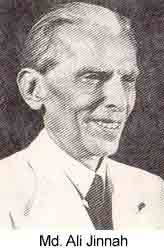

 |  |
 M.A. Jinnah came back to India after becoming a Barrister in 1906 as a secular, liberal nationalist, a follower of Dadabhai Naoroji. On his return, he immediately joined the Congress and acted as Dadabhai's secretary at the Calcutta session of the Congress in 1906. He was the opponent of the Muslim League then being founded. The Agha Khan, the first president of the League, was to write later that Jinnah was 'Our toughest opponent in 1906.'
M.A. Jinnah came back to India after becoming a Barrister in 1906 as a secular, liberal nationalist, a follower of Dadabhai Naoroji. On his return, he immediately joined the Congress and acted as Dadabhai's secretary at the Calcutta session of the Congress in 1906. He was the opponent of the Muslim League then being founded. The Agha Khan, the first president of the League, was to write later that Jinnah was 'Our toughest opponent in 1906.'The first step towards communalism was taken without any desire of his own and perhaps against his own wishes when he entered the Central Legislative Council from Bombay as a Muslim member under the system of separate electorates. The real slide down began when from a nationalist pure and simple he became communal nationalist in 1913 when he joined the Muslim League. During the 1920s, Jinnah's nationalism was not fully swallowed by communalism. He revived the down-and-out Muslim League in 1924 and started building it upon and around the demand for safeguarding 'the interest and rights of the Muslims.' His politics were now based on the basic communal idea that 'Muslims should organize themselves, stand united and should press every reasonable point for the protection of their community.' Jinnah was further alienated from the main currents of nationalism as the Congress organized the massive mass movement of 1930 and started moving towards a more radical socio-economic programme. Moreover, the Muslim masses where swiftly shifting towards the natinalist and left-wing politics and ideologies. Jinnah was faced with a dilemma. He saw little light; and decided to stay mostly in Britain. But Jinnah was too much of a man of action and of politics to stay there. He returned to India in 1936 to once again revive the Muslim League. next page >> |
Copyright ©2000 indiansaga.info. All rights reserved.
By using this service, you accept that you won't copy or use the data given in this website for any commercial purpose.
The material on indiansaga.info is for informational & educational purpose only.
This site is best viewed at 800 X 600 picture resolution.